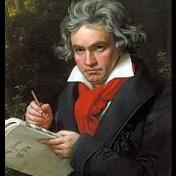Search the Community
Showing results for tags 'project'.
-
I'd like to show you my next project. I'm open to any ideas.... First, a few words about my background: I'm not a musician, it's not my occupation. In fact, I am a physician (hematologist) and I deal with leukemia, lymphoma, bone marrow transplant, cellular therapy, etc.... But since I was a child, a had a Humanist spirit and I always knew I would not only do one thing in life. So, I have studied many things, in depth. I love music, and once I had my life on track, I retook my love for music seriously. I studied harmony, counterpoint, reharmonization, orchestration, etc... Partly as a self-taught, partly attending official courses. I started a blog (in Spanish) because I noticed there were almost no information about many techniques. And more, many things were explained or simply exposed in a theoretical way. I focused on how to use tools for composing. I tell you this to put one issue on the table: I have little time to compose music in large formats because the remaining time my occupation lefts, I use it in this "pedagogical" projects. Perhaps, some day, I'll stop learning myself and showing others what I discover, and begin to write what I like. My natural style is contemporary, but I believe a composer must know how music worked in the renaissance, baroque, classicism, romanticism, whatever. In my journey, I have discovered that the biggest pillar or music is to convey emotions. The Baroque era was a peak when we think of it. They took a lot of elements from the past, and the legacy is currently seen in music. Baroque musicians (or any artist) based their music on the theory of affects, or emotion, which is constructed by: a) Musical patterns that wanted to express something (many many years later called Schemata) b) Musical rhetorics. Rhetoric in the simplest sense is the art or the craft of persuasion or discourse. It began even before the Greeks. In the Middle Ages (cantus firmus) it was incorporated to the music - text to influence the people. When music took other direction, baroque composers translated many thetoric figures of speech into music, trying to give music an expressive side. Well, I have worked a lot in schemata, and wrote a lot of examples in my blog. Now I am diving in musical rhetoric. As you can guess, there is not much information about it (even in English). There are many references to many many many books and treatises written in the 18th century explaining this. But today, it is difficult to understand them. The examples were taken from modal and ancient music. Besides, rethoric figures can be understood in many ways. How would you use ephiphora, chiasmus, polysindeton, etc.... in music? That's what I'm triying to answer. .... To be continued in the next message (this is too long).
-
I have started a long term project related to the planets. Now, my projects are basically divided into short term and long term. Short term projects are those for which I set a deadline(or in composing competitions, deadline is already set) of 2 months or less. And then there are the long term projects for which I don't expect to finish for at least 3 months. Full string quartet would probably take 3 months for me to compose at minimum. Full Symphony is still in the 1+ years range, though I feel like I'm getting more capable of achieving it and my compositional dream, the piano concerto, with every passing month, since I compose daily and have gotten to where orchestral writing isn't so overwhelming. Anyway, back to the planets. Unlike Holst's suite The Planets, I'm doing things different in these ways: Writing in planet order, so Mercury is first and not third as in the Holst piece I'm including Earth and Pluto in my piece This is the biggest difference, my piece is based on the physical aspects of the planets, not the mythology of the gods of the same name But there are also similarities to the Holst piece, namely that it is a suite for an orchestra and that each movement has a different instrumentation. Jupiter will be the most dense in instrumentation and I think Pluto will be the most bare in instrumentation, with Neptune, Mercury, and Mars also being relatively bare in instrumentation. I'm working on the Mercury movement right now and I plan to use 2 distant keys, 4 sharps and 4 flats along with other characteristics to differentiate the hot, daytime section from the icy, nighttime section. This 2 sections of extreme contrast being unified is related to the fact that a solar day on Mercury = 2 Mercury years. Here are some characteristics that will differ between the 2 sections of the movement: Degree of rhythmic complexity -> Hot section will have more rhythmic complexity than the Icy section Instrumental density -> Not necessaraily the actual instrumentation, but the density of it will be less in the Icy section Harmonic dissonance -> Hot section will have more harmonic dissonance And here is how the instrumental density will change in the Icy section: Strings go pizzicato Piano becomes more melodically dominant(in the Hot section, it's mainly for a rhythmic and harmonic purpose) Woodwinds more dominant Possibly forgoing the horns, or at least keeping them quiet(they blend better with and provide more fullness to the woodwinds at quiet dynamics I think) And I know the glockenspiel can give an icy tone. In fact, when I do hear an icy tone in music, it's usually one of 2 instruments at high pitch, Piano or Glockenspiel(more often Piano than Glockenspiel). And I have used this high pitch piano = icy or wintery feel on multiple occasions. But should I have the glockenspiel in the Mercury movement or save it for the Saturn movement? In the Saturn movement, this appearance of the glockenspiel will represent the glistening icy beauty that is Saturn's rings. Should I save it for just that movement though? After all, some other movements will have an icy tone in part of it, namely Mercury as already stated, Mars, possibly Jupiter(if I include the Galilean moons that is), Uranus, Neptune, and Pluto. On the other hand, with possibly the exception of Pluto, it isn't very glistening like it is with Saturn's rings, just cold. And in Mercury in particular, I'm wondering if the addition of glockenspiel will bring the extreme contrast too far for it to sound unified in any sense. And yet, I feel like having Saturn be the only movement with glockenspiel in its orchestra is somehow wrong when 6, possibly 7 out of 9 movements will have an icy tone in at least part of it(only movements guaranteed to not have this icy tone are Venus, which will sound like Hell has ensued, and Earth, in which I plan on striking that perfect balance to get across that it is the only planet with life as we know it). So, what should I do? Should I have it in Mercury? Introduce it in Mars or Jupiter? Save it for Saturn and possibly Pluto?
- 6 replies
-
- orchestral
- instrumentation
-
(and 1 more)
Tagged with:
-

Orchestral project
Luis Hernández posted a topic in Incomplete Works; Writer's Block and Suggestions
What do you think? Should I continue... It's incomplete, of course. All is based on a PC set (except the very first chords)... It's in Concert Pitch... -
New project loop I was working on, looking to see where stands.
-
I was randomly bored, and an idea came out of nowhere to my mind. A collaboration of multi-genres! The idea is, every composer taking part will create a small composition that fits with the theme of the full composition. The combination of different genres might not always sound like a decent idea, but it can work. And with the skills of the composers in this forum it can work very well.. but we encounter an issue which is the difference of tools used.. Therefore, lots of mixing and editing will have to go into this (I can do that, unless anyone feels they're more capable.. I'm not the best at it), it won't be an easy project unless we want some crappy result. Based on the number of participants the segments will be divided. Also the full length of the composition will be voted on once there's a decent number of participants of about 4 or more. So basically, I'll have to start the composition, giving a general idea on the theme to be followed, for example.. grief.. victory.. relief.. misery.. etc... But before that, what are you opinions of this idea? Participants @Maarten Bauer @Monarcheon @ilv
-
This was a project I did for English class where I wrote a duet for french horn and piano to represent the two ways the character Caliban is viewed in Shakespeare's play, the Tempest. The outside sections show him as a devil, the inside shows his humanlike qualities. I would love to hear feedback on this!
- 1 reply
-
- shakespeare
- thetempest
-
(and 4 more)
Tagged with:
-
Hey, Since I been telling everyone about this project for a while. I'm giving it a go and FINALLY have it up. The project video isn't my favorite but the best I could do until I get a new camera capable of making an actual video. If anyone wants to support, please feel free! Any support would really help! http://www.kickstarter.com/projects/1881837993/miniatures-of-the-modern-era





